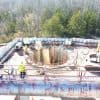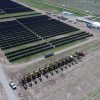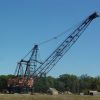PROJECT DETAILS
Northwest Arkansas, home of the Wal-Mart corporate offices, is one of the fastest growing residential and commercial hubs of the central United States. The rapid growth of this area challenges civil engineers to meet the growing demand for power and water.
 Beaver Water District treats and supplies a major portion of the drinking water for Bentonville and surrounding communities. The current facility has a capacity of 70 million gallons of water per day, with a demand that is growing by leaps and bounds. In response to this increasing demand for water, Beaver Water District has engineered and implemented an expansion project which will double the capacity of the existing treatment plant, with a built in capacity of an additional 60 million gallons per day if required in the future.
Beaver Water District treats and supplies a major portion of the drinking water for Bentonville and surrounding communities. The current facility has a capacity of 70 million gallons of water per day, with a demand that is growing by leaps and bounds. In response to this increasing demand for water, Beaver Water District has engineered and implemented an expansion project which will double the capacity of the existing treatment plant, with a built in capacity of an additional 60 million gallons per day if required in the future.
A team of engineers, geologists, and general construction workers took on this substantial project. Their objective was to take a piece of lake-front property and turn it into a water pumping facility. The Beaver Water District’s intake facilities expansion started in May, 2003 and is due for completion in March, 2005, coinciding with the completion of Beaver Water District’s complete system upgrade. The intake facilities expansion is a $13.4 Million project consisting of two new structures; the raw water intake structure with its support electrical building and the renovation of an existing prechlorination building.
Garney Companies, Inc. is the General Contractor for the Beaver Water District, Intake Facilities Expansion project. The project is designed and managed by MWH Americas, Inc., in association with Bennett/Staheli Engineers, Sacramento, CA and McGoodwin, Williams & Yates, Inc., Fayetteville, AR. Jim Holt, Garney’s Senior Project Manager, and Sandra Holt have temporarily relocated to Lowell, AR while this project is in progress. With Jim’s ability to efficiently delegate work and his local labor, he has the project well underway.
To access the new water treatment plant site, it was necessary to clear and remove trees for the construction of two roads off of the existing water treatment road. The site then required a substantial amount of earthwork to remove all dirt and material down to the bedrock. The objective was to clear an area large enough to work and keep the slopes from sliding into the shafts, while minimizing the amount of disturbed land. The twin shafts will contain the pumps that will feed water from the lake to the treatment plant through a 60” line.
Dykon Blasting Corp., Tulsa, OK, drilled and blasted these shafts through solid limestone and shale. The 33-foot diameter shafts were blasted alternating from one to the other, achieving 10-foot deep cuts each time. The outer walls of the shafts were drilled and trim blasted to protect the walls of the shaft from over break and produced picture-perfect, smooth walls in the limestone.
To meet the strict time line for this project, Garney’s skilled workforce used a crane for continuous movement of men, equipment, and materials back and forth between the two shafts. The shafts were excavated alternating from one to the other to maximize production and minimize the potential for damage to the other shaft.
In order to meet the rigid time table, Garney, with the use of their crane, assisted the excavation in one shaft while Dykon’s workforce drilled and prepared the blasting for the other.







